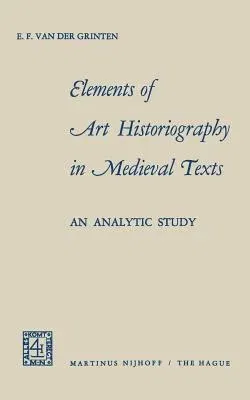The attitude of medieval men of letters towards plastic arts,
architecture and applied art has so far been studied from a primarily
aesthetic point of view. The cause of this may be found, I offer no
opinion on it, in the conceptions of the authors who have been
publishing on this during the last seventy-five years or in the fact
that most medieval texts that until recently were available in editions,
were for the greater part works of a theological, mystical or 1
encyclopaedic-theoretical kind. Anyhow, it is an estab- lished fact that
these studies were brought to bear on the texts of a limited number of
well-known medieval writers, such as: Augustine, Isidore of Sevilla,
Strabo, Scotus Erigena, Alcuin, Hugh and Richard of S. Victor, Honore of
Autun, Bonaventure, Thomas Aquinas and Vincent of Beauvais. The writings
of these authors had been published in large series such as Migne's
Patr%gia Latina, the 3 1 L. Venturi, Storia della critica d'arte, Turin
1964 (1st ed. Brussels 1938); E. de Bruyne, Etudes d'Esthetique
medievale, 3 vols, Bruges 1946; R. Assunto, La critica d'arte nel
pensiero medioevale, Milan 1961; id., Die Theorie des SchOnen im
Mittelalter, Cologne 1963; E. F. van der Grinten, Enquiries into the
History of Art Historical Writing, Amsterdam 1952; L. Grassi,
Costruzione della critica d'arte, Rome 1955; C. Barret, "Medieval Art
Criticism", The British Journal of Aesthetics 5 (1965), 25-36;
Encyclopedia of World Art, vol.


